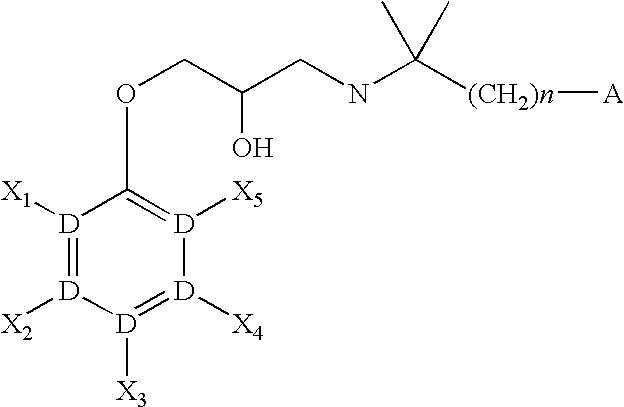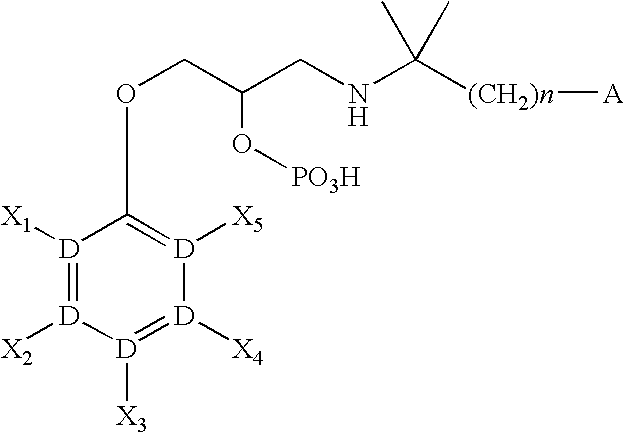CaSR antagonist
a calcium receptor and antagonistic technology, applied in the field of compounds, can solve the problems of threatening lives, affecting the treatment effect of osteoporosis, and affecting the quality of life of patients, and achieve the effects of superior anti-cause calcium receptor action, superior treatment drug for osteoporosis, and increased blood pth concentration
- Summary
- Abstract
- Description
- Claims
- Application Information
AI Technical Summary
Benefits of technology
Problems solved by technology
Method used
Image
Examples
example 1
3-[2-[(1R)-1-[(2R)-2-hydroxy-3-[[2-methyl-1-(naphthalen-2-yl)propan-2-yl]amino]propoxy]ethyl]phenyl]propionic acid
Step 1
(2R)-2-[[(1R)-1-(2-bromophenyl)ethoxy]methyl]oxirane
[0203]
[0204](R)-1-(2-Bromophenyl)ethanol (30.0 g) and (R)-glycidyl nosylate(50.3 g) were dissolved in N,N-dimethylformamide (300 ml), sodium hydride (7.76 g, 60% in oil) was added and the mixture was stirred at room temperature for 2 hr. 10% Aqueous citric acid (600 ml) was added to the reaction mixture, and the mixture was extracted with ethyl acetate. The organic layer was washed successively with water and saturated brine, dried over anhydrous sodium sulfate, and concentrated under reduced pressure. The obtained residue was purified by silica gel column chromatography (hexane:ethyl acetate=6:1) to give the title compound (32.9 g).
[0205]1H-NMR (300 MHz, δppm, CDCl3) 7.53-7.49 (2H, m), 7.37-7.32 (1H, m), 7.16-7.10 (1H, m), 4.89 (1H, q, J=6.4 Hz), 3.62-3.57 (1H, m), 3.34-3.28 (1H, m), 3.18-3.12 (1H, m), 2.79-2.76 ...
example 2
6-[2-[(1R)-1-[(2R)-2-hydroxy-3-[[2-methyl-1-(naphthalen-2-yl)propan-2-yl]amino]propoxy]ethyl]phenyl]hexanoic acid
Step 1
Methyl 6-[2-[(1R)-1-(((2R)-oxiranyl)methoxy)ethyl]phenyl]hexanoate
[0216]
[0217]To methyl 5-hexenoate (608 mg) was added 0.5 M 9-bora bicyclo[3.3.1]nonane-tetrahydrofuran solution (9.5 ml) under ice-cooling and the mixture was stirred overnight at room temperature. The reaction mixture was added dropwise to a suspension of tetrahydrofuran (10 ml), (2R)-2-[[(1R)-1-(2-bromophenyl)ethoxy]methyl]oxirane (1.06 g) obtained in Example 1, Step 1, tri-potassium phosphate (1.32 g), [bis(diphenylphosphino)ferrocene]dichloropalladium(II) complex with dichloromethane (170 mg) and the mixture was heated under reflux for 7 hr. The reaction mixture was cooled to room temperature, water was added, and the mixture was extracted with ethyl acetate. The organic layer was washed with brine, dried over anhydrous sodium sulfate, and concentrated under reduced pressure. The obtained residue ...
example 3
(2R)-1-dicyclopropylmethoxy-3-[[2-methyl-1-(naphthalen-2-yl)propan-2-yl]amino]propan-2-ol
Step 1
dicyclopropylmethanol
[0224]
[0225]To a solution of dicyclopropylketone (1.21 g) in methanol (12 ml) was added sodium borohydride (407 mg), and the mixture was stirred at room temperature for 3 hr. The reaction mixture was concentrated under reduced pressure. Water was added to the obtained residue, and the mixture was extracted with ethyl acetate. The organic layer was washed successively with water and brine, dried over anhydrous sodium sulfate, and concentrated under reduced pressure to give the title compound (885 mg).
Step 2
(2R)-2-[(dicyclopropylmethoxy)methyl]oxirane
[0226]
[0227]Dicyclopropylmethanol (880 mg) obtained in Step 1 and (R)-glycidyl nosylate (3.05 g) were dissolved in tetrahydrofuran (7.3 ml), sodium hydride (471 mg) and dimethyl sulfoxide (1.5 ml) were added under ice-cooling, and the mixture was stirred at room temperature for 5 hr. Water was poured into the reaction mixtur...
PUM
| Property | Measurement | Unit |
|---|---|---|
| concentration | aaaaa | aaaaa |
| concentration | aaaaa | aaaaa |
| concentration | aaaaa | aaaaa |
Abstract
Description
Claims
Application Information
 Login to View More
Login to View More - R&D
- Intellectual Property
- Life Sciences
- Materials
- Tech Scout
- Unparalleled Data Quality
- Higher Quality Content
- 60% Fewer Hallucinations
Browse by: Latest US Patents, China's latest patents, Technical Efficacy Thesaurus, Application Domain, Technology Topic, Popular Technical Reports.
© 2025 PatSnap. All rights reserved.Legal|Privacy policy|Modern Slavery Act Transparency Statement|Sitemap|About US| Contact US: help@patsnap.com



